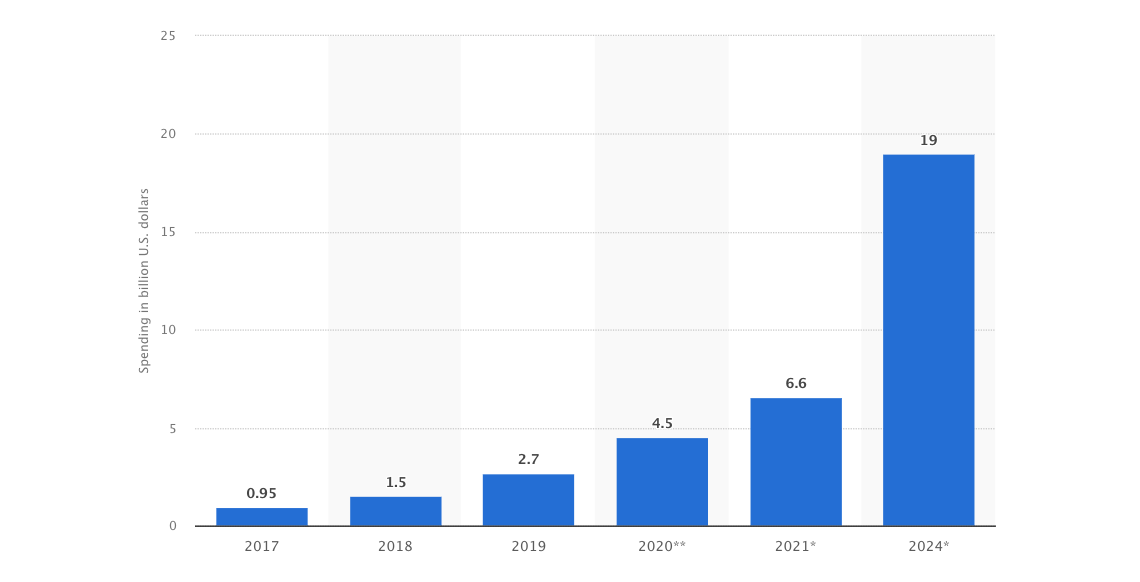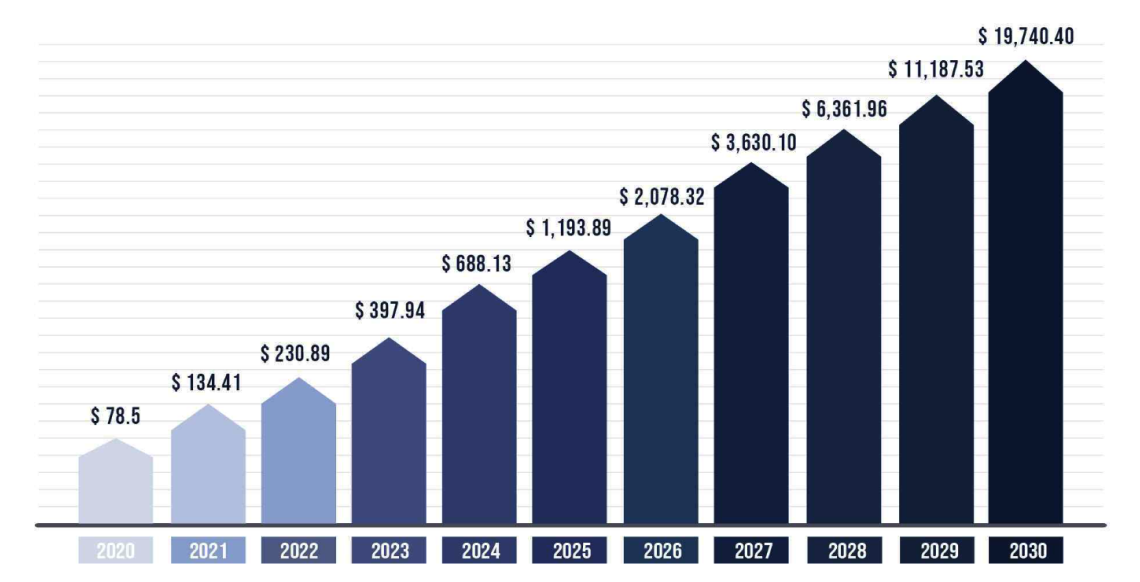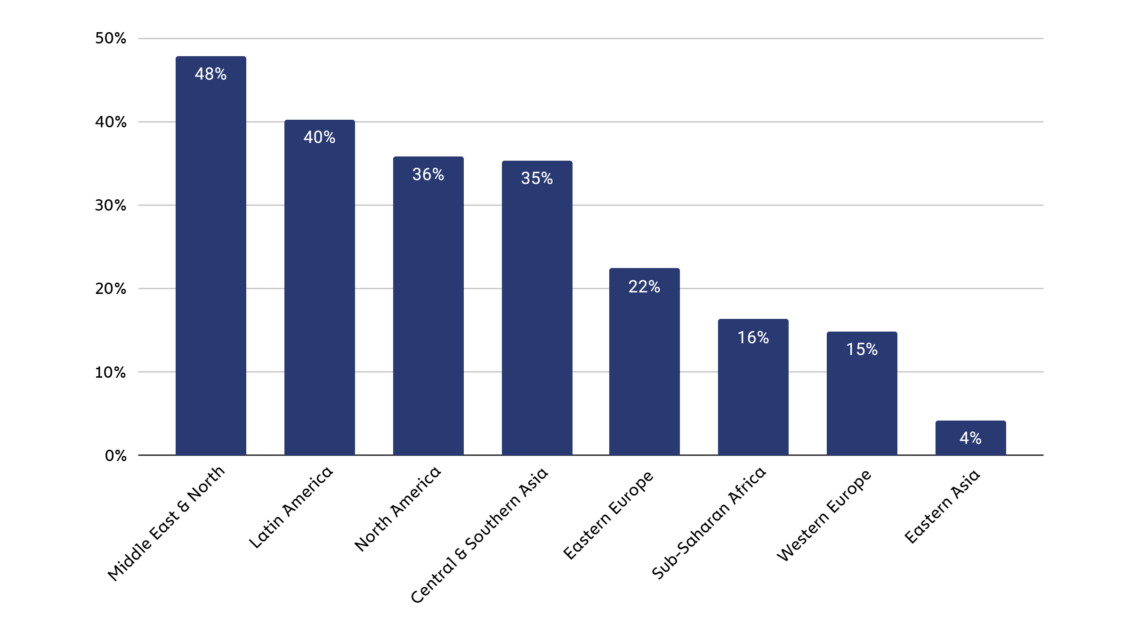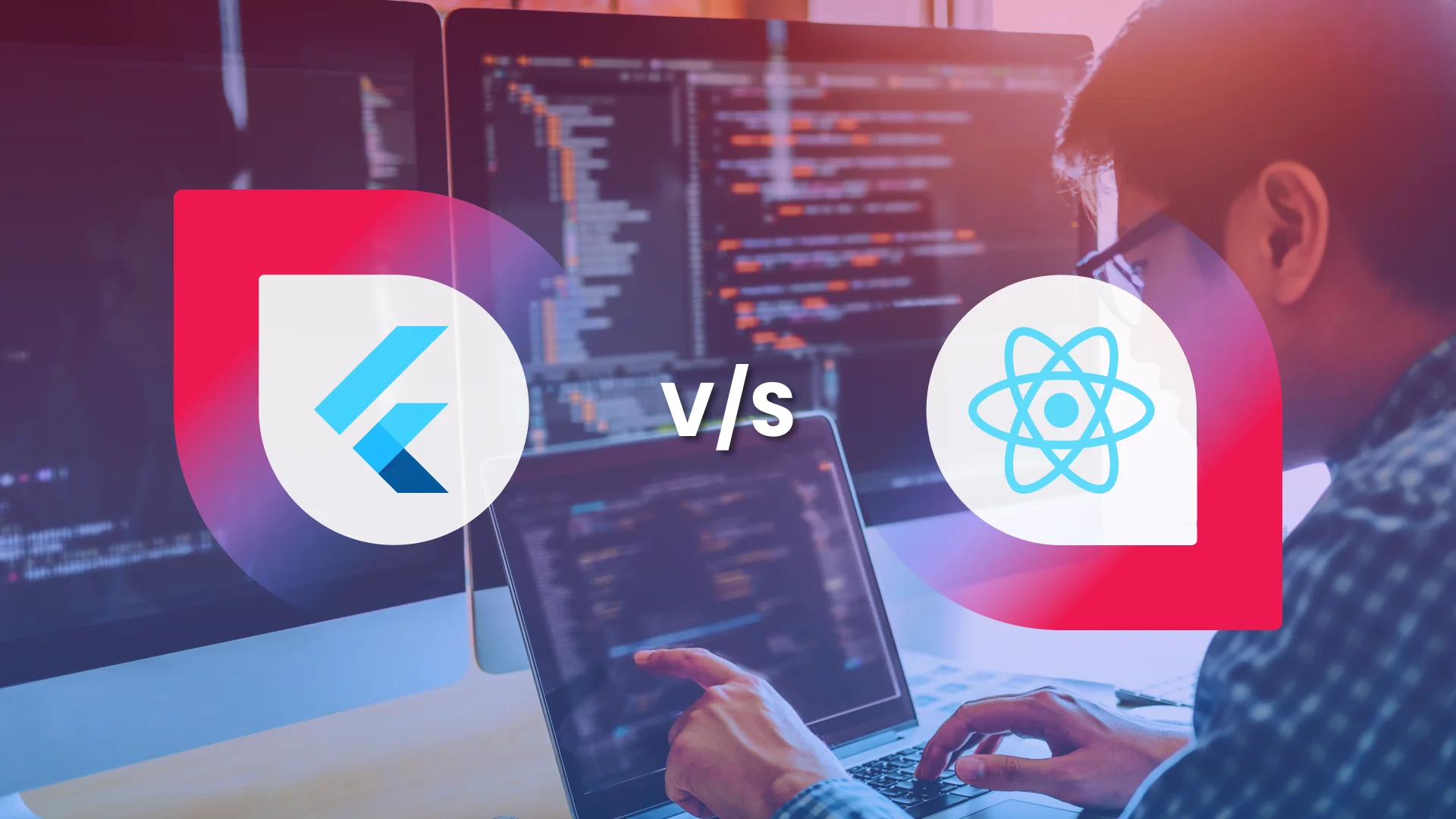Top 15 Blockchain Technology Trends to Follow in 2024
- Mobile
- April 28, 2023
Soon after the introduction of bitcoin in 2009, we have witnessed several other cryptocurrencies making their way out in the center. And with that, Blockchain technology has a certain revolution in digital currencies. With the passage of time, the Blockchain is ascending one step further up providing new incentives and opportunities to the financial sector and corporate world.
According to study, the global spending on blockchain solutions will continue to grow in the coming years, reaching almost 19 billion US dollars by 2024.

The upsurge in the number of Blockchain-based applications is merely indicating its bright prospect in the future.
In fact, the Blockchain technology has given rise to the Initial Coin Offering (ICO), which is a fundraising tool helping in the transaction of future crypto coins in exchange of the cryptocurrencies.
Current Blockchain Development Trends
Right from relatively impacting AI to IoT; Metaverse to NFT, blockchain is surely a rapidly growing technology! Here, we are stating the top blockchain technology trends that will amaze you:
1. NFT Boom
NFTs (Non-Fungible Tokens) have become a significant application of blockchain technology. NFTs are unique digital assets that can represent ownership or proof of authenticity for various types of digital or physical items, such as artwork, collectibles, virtual real estate, music, videos, and more.
Blockchain technology, specifically using platforms such as Ethereum, has been widely adopted for creating and trading NFTs. The blockchain ensures the security, immutability, and transparency of NFT transactions and ownership records. Each NFT is represented by a unique token that contains metadata and references to the asset it represents.
The introduction of NFTs has had a profound impact on various industries. Artists and creators can tokenize and sell their digital artwork directly to collectors, eliminating the need for intermediaries. The ownership and provenance of these digital assets can be easily verified through the blockchain, which adds value and authenticity to the NFTs.
NFTs have also facilitated new revenue streams for content creators and influencers. They can monetize their digital content by tokenizing and selling limited editions or unique experiences. Additionally, NFTs have opened up possibilities for decentralized virtual worlds and gaming, where users can own and trade virtual assets within the metaverse.
2. The Impact on the Internet of Things (IoT)
As per the precedence research, the blockchain IoT market was last valued at $134.41 million in 2021 and is expected to reach $19.740 billion by 2030 at a CAGR of 73.5%. In fact, the experts also believe that Blockchain along with the Internet of Things will see a surge in automated insurance policies.

Furthermore, Blockchain will become a vital asset in third-generation security. One also cannot deny the fact that both these technologies will take industries to a higher level as time progresses.
Now talking from the digital transaction point of view, besides becoming securer, the speed becomes faster and also affordable. The business is also said to become automated and it will simplify the complicated centralized IT infrastructure.
3. Asset Tokenization
Asset tokenization in blockchain refers to the process of representing real-world assets as digital tokens on a blockchain network. It involves dividing an asset, such as real estate, artwork, commodities, or even intellectual property rights, into smaller units and creating tokens that represent ownership or a share in the asset. These tokens can then be traded and transferred on a blockchain platform.
Tokens are created on a blockchain platform, often using a standardized protocol such as ERC-20 or ERC-721 on Ethereum. These tokens represent ownership or a share in the underlying asset.
This too is one of the growing trends of blockchain technology in the year 2023 and there is the likelihood that it will continue to boom in the coming years.
4. The Cybersecurity Will Become Robust
After the ransomware attacks, much attention was needed to strengthen the cyber security system and Blockchain will certainly act as a protective covering for cryptocurrencies.
The problems like Equifax cyberattack, in which more than 40% of the US population were affected, have enabled us to bring a top-notch secure Blockchain identity approach to protect the current identity data systems.
5. Metaverse
Both the metaverse and blockchain technology have been areas of continued interest and development in recent years. The concept of the metaverse, as a virtual reality space where users can interact with each other and digital content, has gained attention from various industries and investors.
Blockchain technology, with its potential for decentralized and secure transactions, has also been explored for its potential applications within the metaverse.
6. Interoperability
Interoperability in blockchain refers to the ability of different blockchain networks and their associated cryptocurrencies or smart contracts to seamlessly communicate, interact, and exchange information or value with each other. It enables data and assets to move between different blockchain platforms and protocols, breaking down silos and facilitating broader adoption and utility of blockchain technology.
Interoperability is one of the most important trends of blockchain in 2023 because it allows for the creation of a connected ecosystem where various blockchains can collaborate and leverage each other’s strengths.
Also, interoperability enables the execution of smart contracts that involve multiple blockchain platforms. It allows developers to leverage the unique features of different blockchains and create complex applications that span across multiple networks.
There are many other points that make it one of the most prominent trends of blockchain in 2024. You will soon see it emerging in the market of blockchain at an even greater pace.
7. Blockchain-as-a-Service
Blockchain-as-a-Service (BaaS) is a growing trend in the blockchain industry. BaaS refers to the provision of blockchain infrastructure and tools by cloud service providers to enable businesses and developers to build, deploy, and manage blockchain applications without the need to set up and maintain their own blockchain networks.
BaaS platforms offer pre-configured blockchain networks and development tools, making it easier for businesses and developers to create blockchain applications. It eliminates the need to understand the complexities of blockchain infrastructure, such as node deployment and network management.
BaaS platforms typically offer scalability features, allowing applications to handle increasing transaction volumes as needed. Additionally, BaaS providers often support multiple blockchain protocols, giving businesses the flexibility to choose the one that best suits their requirements.
8. The Blend of Blockchain with Artificial Intelligence (AI)
The ones associated with mobile app development are not unfamiliar with what Artificial Intelligence (AI) is and how it has become a blockbuster in the technological arena. The basic algorithm of AI has enabled machines to perform functions that they were not programmed for.
Now, just imagine if this advanced technology will shake hands with Blockchain, what the outcome would be. The question is how the Blockchain will further boost AI and increase its potential to the fullest.
We are aware that machines in order to offer their maximum output value and capacity, need to have access to the big data. The bulk of the big data is mainly available for the mainstream and is reserved for analytics. Therefore, if you want to exchange this data economically and hassle-free, the Blockchain would play a major role.
Blockchain technology is known for its robust security and so the big data providers don’t have to worry on that front. They can easily link up with AI developers. This rather helps in the development of complex machine learning algorithms and devices that can access the data for achieving artificial sentience.
9. Growth of DeFi
Decentralized Finance (DeFi) refers to the application of blockchain technology and cryptocurrencies to recreate and improve upon traditional financial systems in a decentralized manner. DeFi aims to eliminate intermediaries such as banks, brokers, and other financial institutions, enabling individuals to have direct control over their assets and participate in financial activities without relying on centralized authorities.
DeFi typically involves the use of smart contracts, which are self-executing contracts with the terms of the agreement directly written into code. These smart contracts are deployed on a blockchain platform, usually Ethereum, and enable the creation and execution of various financial applications and protocols.
It’s one of the growing trends of blockchain technology that has created a massive positive impact on the growth of technology.
10. Asia and the Middle East to be Big Blockchain Markets
As per the prediction and report it is seen that Blockchain will get more limelight and focus in the Asian as well as Middle East markets. It is because the customers there have already gained huge interest in this technology.
In fact, more than 13 of the 20 largest Venture Capitals in Asia have invested in blockchain development platforms in the past couple of years.
Fenbushi Capital and Hashkey Capital have invested in 3-4 companies. Not just that, these VCs are also extensively investing in NFTs and DeFi projects – the largest and fastest-growing crypto areas.
According to Global Crypto Adoption Index 2022, the Middle East and North Africa (MENA) region becomes the fastest-growing crypto market with 48% growth for the year 2021-2022.

11. Federated Blockchain
Federated blockchain refers to a type of blockchain network that combines the benefits of both public and private blockchains by allowing multiple entities to participate in the consensus process. In a federated blockchain, a predefined group of nodes or participants form a consortium and collectively validate transactions and maintain the blockchain.
Federated blockchains are usually permissioned, meaning that participants are granted specific access and control rights to join the network. This approach allows for higher scalability and privacy compared to public blockchains.
12. Stablecoins
Stablecoins are cryptocurrencies that are designed to maintain a stable value, often pegged to a specific fiat currency like the US dollar or a basket of assets. They aim to address the volatility commonly associated with other cryptocurrencies like Bitcoin or Ethereum.
What happens is that the value of stablecoins almost always remains the same and does not fluctuate as violently as the crypto coins.
As one of the other major trends of Blockchain, stablecoins can be viewed as a new form of investment for crypto volatility victims who are looking to maximize their profit.
13. Cryptocurrency Insurance
Cryptocurrency insurance is a type of coverage designed to protect individuals and businesses from financial losses related to theft, hacks, fraud, or other risks associated with owning and transacting cryptocurrencies.
While the concept of cryptocurrency insurance is still relatively new, it has gained attention as the adoption and use of digital currencies, such as Bitcoin and Ethereum, has become more widespread and has become a part of prominent trends of blockchain.
It’s important to note that while blockchain technology offers many advantages for cryptocurrency insurance, but, at the same time, it does not guarantee absolute protection against risks or eliminate the need for traditional insurance mechanisms.
Cryptocurrency insurance is a very vast and complex field that requires a comprehensive understanding of both blockchain technology and insurance principles to develop effective and reliable solutions.
But it still has gained a prominent coverage in the blockchain market; it has a long way to go.
14. Increased Usage of Blockchain in Enterprises
The adoption of blockchain technology by enterprises has been steadily increasing in the year 2023. As per the CasperLabs survey, around 90% of global business respondents report deploying blockchain in some capacity.
Blockchain provides a transparent and immutable ledger that allows businesses to track and verify transactions, contracts, and supply chain activities. This transparency and traceability can enhance trust among participants and enable more efficient auditing and compliance processes.
It also offers solutions for optimizing supply chain processes, reducing inefficiencies, and enhancing transparency. By recording each transaction and movement of goods on a blockchain, businesses can improve inventory management, track provenance, and streamline logistics.
So, these enterprises are likely to adopt blockchain technology in the coming years at an even greater pace.
15. Blockchain Network to Integrate the Rule of Law
The Smart Contract is closely connected with Blockchain and Bitcoin. The Smart Contract is a code stored in computation and primarily used for automating the business operation process. So, for business firms looking to control Blockchain solutions, this tool will become more prominent and can be used as a productivity enabler.
However, in order to resolve any dispute or disagreement between the two parties, the Blockchain is trying to enforce the rule of law. This is mainly because it is a decentralized currency and has no authority. The two business groups will have to agree to certain rules before joining the Blockchain network. However, nothing conclusive has been found on how to enforce the laws.
Conclusion
So, we can see that Blockchain technology has got a great future ahead and it will not offer a positive impact on business enterprises but also will influence human lives.
Blockchain technology will also encourage individuals to introduce new currencies and cryptocurrency exchanges. It will meet with IoT to take technology into top gear which is hardly imaginable.
So, just keep following the latest Blockchain trends and stay tuned for the latest updates on the Blockchain. Planning to build a blockchain solution? Share your requirements with us today!
FAQs on Blockchain Technology
There are three types of blockchain: Public blockchain, Permissioned or private blockchain, and Federated or consortium blockchain
Clearly, the Future Lies with Blockchain Technology! Transactions requiring verification and traceability can be verified and traced using blockchain. Data transfer processing can be sped up, compliance costs can be reduced, and data security can be enhanced. An audit of a product’s origin can be made easier with the help of blockchain technology. Out and out, blockchain technology is the future!













